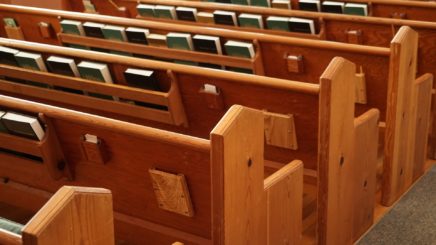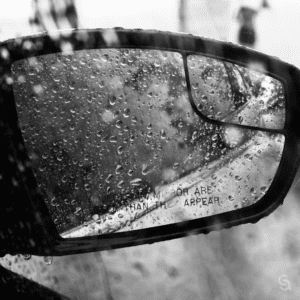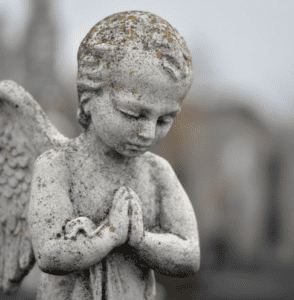 Just before Memorial Day weekend, President Trump called for the opening of churches and other houses of worship. And much as I long to be able to attend church again, that made my heart sink. As we’re learning more about risk factors that spread the virus, I keep thinking: It’s family and friends. It’s being with people. It’s being in close contact, sometimes sharing food. It’s living our lives in community. And that, to me, is the very description of church. My church is my spiritual family. We come together. We break bread together. We share life together.
Just before Memorial Day weekend, President Trump called for the opening of churches and other houses of worship. And much as I long to be able to attend church again, that made my heart sink. As we’re learning more about risk factors that spread the virus, I keep thinking: It’s family and friends. It’s being with people. It’s being in close contact, sometimes sharing food. It’s living our lives in community. And that, to me, is the very description of church. My church is my spiritual family. We come together. We break bread together. We share life together.
I understand the longing to be able to return to church. But even this idea of “returning to church” reveals only a partial understanding of the true LIFE of the church! “The church is not a building, it’s the people,” is something we often hear. And it’s true. Church is not a service, it’s a relationship with God, lived out in all areas of our life. Church is a community that is animated by the Holy Spirit. And church is not just a Sunday service—that is an essential and vibrant part of the expression of church, to be sure, but it is not the church as a whole.
The church is a living and breathing thing. The bride of Christ. One of my favorite churches in Berkeley, CA, is called Church Without Walls, and I think that captures this truth quite well. Closing the buildings where churches are housed has not stopped the people from worshiping, from praying, and from doing many of the spiritual practices that nourish our communal spiritual life. We’re doing them differently, to be sure, and we’re missing the joy that comes from spiritual practice in community. But we’re still living out what it means to be the church.
Closing the buildings where churches are housed has not stopped the people from worshiping, from praying, and from doing many of the spiritual practices that nourish our communal spiritual life. We’re doing them differently, to be sure, and we’re missing the joy that comes from spiritual practice in community. But we’re still living out what it means to be the church.
I’ve been so encouraged by the example of The Church at Work, too. This group of churches in Arlington, VA, has gathered together to pair people who need help making their rent with Christians in their congregation who can cover that rent for 1-2 months. This is a tangible expression of bearing with one another (Ephesians 4:2). This is the church at work. This is an example of the type of worship that is pleasing to God (Isaiah 58), and it doesn’t require a building.
I live in metro Washington DC, which doesn’t have the spread of the virus under control. I think in some communities, it might be safe to open churches. And I’m glad for that. I’m glad that folks will be able to be present, as a community, in a way that can really only happen in person. I’m glad for the power of presence with each other, and of common faith, and a common love for God. I’m glad that those who couldn’t attend services or church programs because of issues with internet access or technology will no longer be left out. And I’m particularly grateful that those who are isolated, or in solo households, will be able to connect with their spiritual family.
But there are many places where local health officials are still urging people not to gather together. And I hope that the Christian church would be a leading example of what it means to set aside our own personal preferences for the good of others. Jesus, as our model and example, set aside his rights and privileges so that others might live. And that is really what we are being called to do.
Keeping churches closed in the context of a global pandemic is not a suppression of people’s right to practice their religion. Through my work, I have talked with leaders in countries where Christians are persecuted, where the consequences of Christian worship is the loss of home, health, job, or even life. Being asked to refrain from attending church in person in order to protect the health and the lives of some of the most vulnerable among us is not persecution. It would cheapen the true sacrifice of these Christians martyrs for us to equate what we are being asked to do with oppression.
Being asked to refrain from attending church in person in order to protect the health and the lives of some of the most vulnerable among us is not persecution. It would cheapen the true sacrifice of these Christians martyrs for us to equate what we are being asked to do with oppression.
One of the Reformation’s gifts to the church was the emphasis on the “priesthood of believers.” This idea that God is close, accessible and near to every one of us. That we do not need a human to mediate that relationship, but that through the Holy Spirit we are all connected to God’s family. We can all embrace and worship God, in the places where we are.
In some ways, our choice to stay home is an act of worship, because it is an act of love. It says, even though I might be able to go out, I choose to stay in. Because there are some folks who cannot stay in, and there are some folks who are very vulnerable. And anything I can do to slow down the spread of this virus or keep it from infecting you, I will do. Because you were made in God’s image. You are a child of God.
 Nikki Toyama-Szeto is Executive Director of Christians for Social Action.
Nikki Toyama-Szeto is Executive Director of Christians for Social Action.


